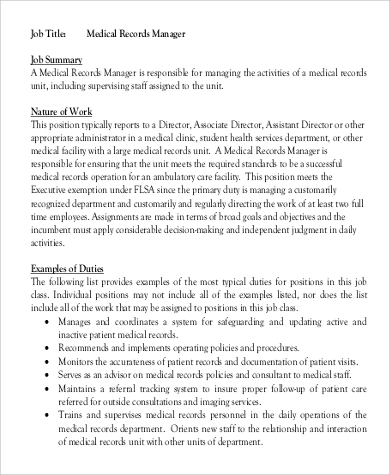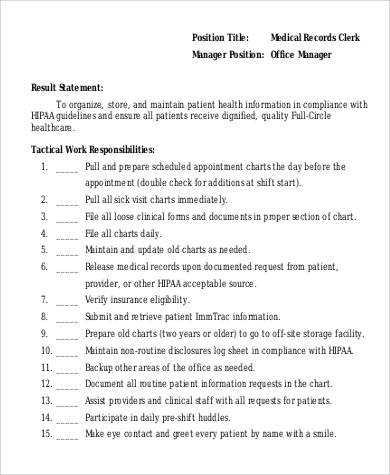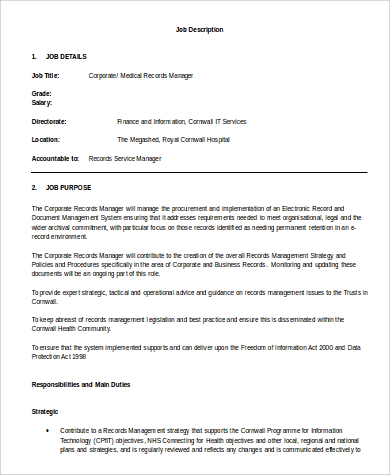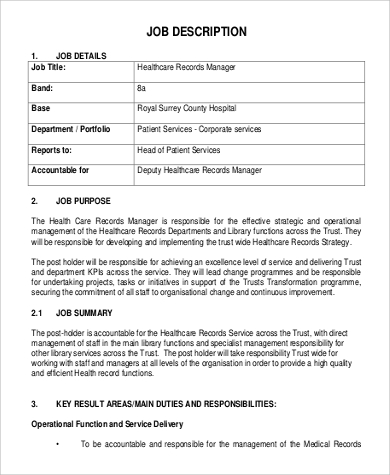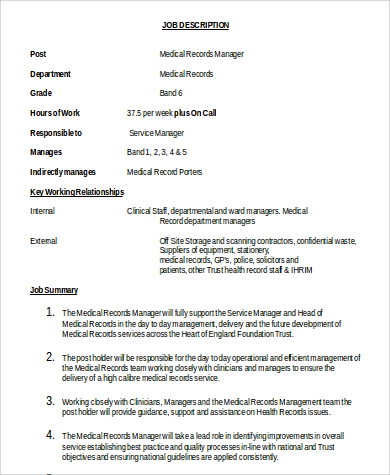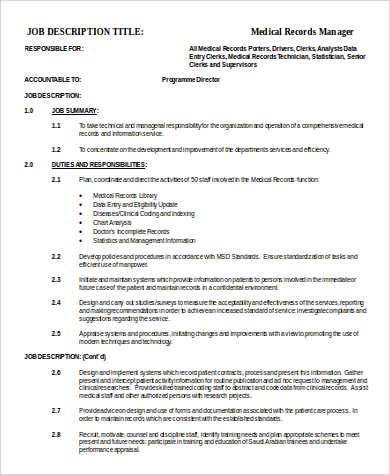Hospitals and clinics hold thousands upon thousands of medical records. It is the responsibility of the facility’s medical records department to see to the proper handling of any and all of these medical information.
This department functions to support the daily duties of physicians and other health care professionals, and its work is integral to how they function. It is driven by a number of medical records clerks or health information technicians, which are overseen by medical records managers. Medical records managers supervise the department’s distinct responsibility for the health care facilities’ repository of records.
If you are interested in becoming one, read on below for medical records manager Job Description Samples for requirements, responsibilities, and more information about the position.
Medical Records Manager Job Description Sample
Medical Records Clerk Office Manager Job Description to Download
Hospital Medical Records Manager Job Description in Word
The Work Settings of Medical Records Managers
In any clinical setting, all posts are required to see to the efficient delivery of their work to generate the overall function of the health care facility. This especially holds true for its medical records department. The people that work herein are like the gatekeepers for all the information that the entire facility works from; ensuring that they accurate, complete, secure, and expediently used.
Medical records professionals may thus work for the following clinical places:
- hospitals,
- clinics,
- physicians’ offices,
- community health centers,
- medical laboratories,
- government health departments,
- mental health facilities, and
- long-term care facilities.
The Responsibilities of Medical Records Managers
Also known or referred to as health information managers or health information administrators, medical records managers have the following duties:
- securing patient information, both written and electronic;
- regulating all medical records;
- supervising the work of medical records clerks;
- hiring new staff members; and
- updating data systems and software.
The Requirements of Medical Records Managers
There are two typical paths to becoming a medical records manager.
- Career advancementAn aspiring medical records manager may start off as a medical records clerk. It often takes a minimum of 5 years for one to progress into the senior position.
- College degreeThe entry requirement for medical records manager is a bachelor’s degree in health information management. Post-graduate programs on the course are also available, and betters one’s qualification for the position.
No certification is required, but having one makes for more attractive applications, and more opportunities for career progression. Professional certification has to be secured from direct institutions, for instance the American Health Information Management Association (AHIMA) in the United States.
The Work of Medical Records Professionals versus Medical Assistants
Medical assistants have more front-desk responsibilities, as outlined in these Medical Assistant Job Description Samples, whereas medical records technicians work at the back-end with records and information.
Free Health Care Medical Records Manager Job Description
Medical Records Manager Job Description Summary Example
Professional Medical Records Manager Job Description
The Qualifications of Medical Records Managers
To effectively carry out their responsibilities, medical records managers must possess the following competencies:
- leadership skills,
- communication skills,
- organizational skills, and
- IT and software skills.
Most importantly, medical records managers are expected to be consistently efficient under the pressures of working at a hospital or in any other health care setting.
For managerial posts in other offices or fields, see these Operation Manager Job Description Samples.
Related Posts
FREE 8+ Sample Product Manager Job Description Templates in PDF | MS Word
FREE 10+ Company Description Samples [ Construction, Secretary, President ]
FREE 9+ Sample Secretary Job Description Templates in PDF | MS Word | Google Docs | Apple Pages
FREE 8+ Tutor Job Description Samples in PDF | MS Word
FREE 11+ Digital Marketing Job Description Samples in MS Word | PDF
FREE 12+ Sample Auditor Job Descriptions in MS Word | PDF | Google Docs | Pages
FREE 12+ IT Intern Job Description Samples in PDF
FREE 9+ Sample Software Developer Job Description Templates in PDF
FREE 9+ Sample Software Engineer Job Description Templates in PDF
FREE 10+ HR Payroll Job Description Samples in MS Word | PDF
FREE 14+ HR Director Job Description Samples in MS Word | PDF
FREE 10+ HR Intern Job Description Samples in MS Word | PDF
FREE 10+ Sample Treasurer Job Descriptions in MS Word | PDF
FREE 6+ Environmental Engineer Job Description Samples in MS Word | PDF
FREE 8+ Construction Worker Job Description Samples in MS Word | PDF
